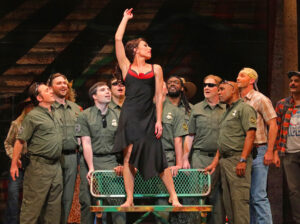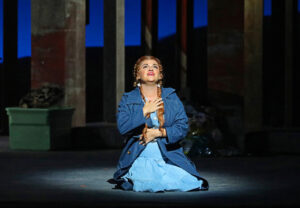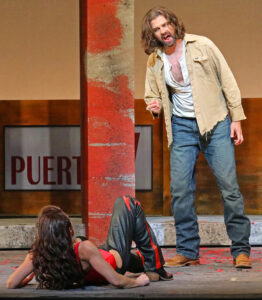The Ties that Bind:
Bizet’s Carmen at the Nashville Opera
The lights in the theatre dim and the chattering crowd is suddenly silent, drinks with condensation dripping off them clutched tightly as the orchestra, one behemoth of magical sound, begins to tune…
Georges Bizet’s Carmen is a well-known opera and is frequently

performed in opera houses around the country. Even so, Nashville opera showed us last Thursday and Saturday night that there are still new and intriguing ways to tell the story of Carmen. As the red curtains rose Thursday night, a multi-colored courtyard was set before the audience. Unlike the original setting of Carmen in Spain, this version is a modern-day setting of a southern, Tex-Mex style courtyard where a factory can be seen on the right, and a guard’s post on the left. The scene comes further to life with the rowdy opera chorus, dressed as guards, factory workers, and even tourists in bright pink hats and cowboy boots, all of which co-mingle, flirt, and even get into fights. Most prominent of all the factory workers is, of course, the unforgettable Carmen. Marina Costa-Jackson makes her Nashville Opera debut as Carmen, the fiery and independent heroine who captures people’s hearts with a mere glance. In the first act, Carmen’s provocative nature is highlighted as she tempts Don José, played by Zach Borichevsky, away from his life as a guard and from the innocent Micaëla, who is played by none other than Kathryn Lewek.

Some of my favorite moments from the opera happen in the first act, one of which being the duet between Don José and Micaëla, who are married in real life. Their voices blend in a gorgeous sound, neither overpowering the other, showing the innocence of Micaëla and José’s relationship, which is blooming in the hope of potential marriage. This scene’s sweetness is contrasted drastically by another scene later in the act during which Carmen is flirting with Don José, vying for his attention. Although her attempts seem fruitless at first, a moment occurs between the pair where all the members of the ensemble freeze, and all that’s left to be seen is a spotlight on Carmen and Don José on opposite ends of the stage, sharing a look of longing. In that movement, some words or feelings are communicated between the couple that no one else is privy to.

The juxtaposition of these two women and their relationships with Don José was made even more clear in the costume choices made for Carmen and Micaëla by Jessica Mueller (costume designer), Pam Lisenby (costume coordinator), and Brittany V.A. Rappise (wig and makeup designer). While Micaëla was consistently wearing the same blue jean dress throughout the production, Carmen was dressed in red and black throughout her multiple costume changes. Could the constant blue of Micaëla’s dress be a symbol of her unwavering devotion to Don José and her innocence? Could the multiple costume changes represent Carmen’s changing attitude toward Don José, and the black and red of her costumes a symbol for less pure feelings?
After a set change accompanied by the incomparable Miles Aubrey, local Nashville singer and guitarist, serenading both Micaëla and the audience with “El Paso” by Marty Robbins, Act 2’s set was revealed. The set was simple, yet beautiful; a dreamily lit cantina furnished with a bar, several tables and chairs, and was back lit with softly glowing light, and strings of hanging lights across the stage. It is here that Carmen meets her next conquest, the biker Escamillo, played by Richard Ollarsaba, also making his debut with the Nashville opera. Ollarsaba played Escamillo to a tee. With charisma and energy, the bass baritone did a fantastic job of portraying the character through his body language, tone, and leather biker’s outfit!

The second half of the opera had still more highlights to offer. After intermission, Act 3 saw Kathryn Lewek as Micaëla shine. Her aria “Je dis que Rien ne M’épouvante” was full of artistry and musical intention. Although gifted with an enormous voice, Lewek is also capable of extreme expression and used pianissimos as well as stretching the tempi of her aria as her character pleads for protection as she travels to find the smugglers Don José has fallen in with. It was easy to tell that the crowd loved her by the tremendous applause that followed the end of her aria.
Nashville opera had one last trick up its sleeve during Carmen’s finale. While traditionally, Carmen and Don José both die at the end of the opera, in Nashville opera’s rendition, this is not the case. Although Carmen is stabbed in the side by a half insane Don José, she manages to take José’s knife from him and deal a fatal wound. Don José collapses on the ground, as does Carmen, the two mirroring each other. However, while Don José does not rise, Carmen does. Slowly staggering to her feet, triumphant, but shaken, Carmen is escorted off the stage by Frasquita and Mercedes.
Carmen was brought to life by Nashville Opera in modern, unique ways this past Thursday and Saturday. Along with a phenomenal cast of singers, the unique setting and staging, and twist ending shed new light on the lush, but tragic story of Carmen.




Appreciate this thoughtful and detailed review. Would love to see some recognition for the very talented local singers in company/chorus… who were integral to realizing this piece in a whole new way.